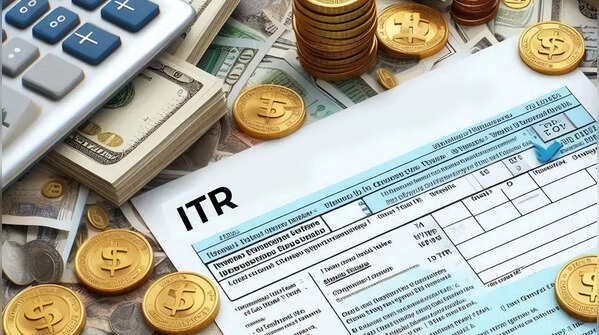- News
- Business News
- India Business News
- ITR e-Filing FY 2023-24: Which Is The Correct Income Tax Return Form For You? From ITR-1 To ITR-7 - Check Here
ITR e-Filing FY 2023-24: Which Is The Correct Income Tax Return Form For You? From ITR-1 To ITR-7 - Check Here
ITR e-Filing: Which Is The Correct Income Tax Return Form For You?
Income Tax Return filing on incometax.gov.in for FY 2023-24: With the July 31 deadline for ITR filing for AY 2024-25 coming closer, it’s important for taxpayers to ensure that they file their income tax return using the correct ITR form. So which ITR form is applicable to you? Is it ITR-1, ITR-2, ITR-3, ITR-4, ITR-5, ITR-6 or ITR-7? Shalini Jain, Tax Partner at EY India in a column in ET explains who can file which ITR form. Let’s take a look: (AI image)

Who Can File ITR 1?
ITR-1 can only be filed by an individual qualifying as ordinarily resident. The individuals should have a total income of up to Rs 50 lakh (after clubbing of income, if any). Their earnings should come from sources like salary or family pension, one house property, other sources like interest, and agricultural income. Agricultural income should be no more than Rs 5,000 after any clubbing. In case of clubbing of income, an individual can file ITR-1 if the income of the other person (whose income the individual is reporting in his ITR) is from sources as mentioned above. (AI image)

Who Cannot File ITR-1?
The following entities cannot file ITR-1: Hindu Undivided Family or HUF, non-residents/resident but not ordinarily resident, director in a company, those with agricultural income over Rs 5,000, ordinarily residents with total income above Rs 50 lakh, those holding assets outside India, those holding investments in unlisted shares, entities with capital gains/losses, income from more than one house property, profits or gains from business or profession, wins from lottery, having income from outside of India on which double taxation relief is to be claimed, those having brought forward losses or losses to be carried forward, those with TDS deductions on cash withdrawals exceeding Rs 1 crore (Rs 20 lakh in some cases), those who have deposited sums in excess of Rs 1 crore in banking company or co-operative bank in a year. Those who are covered under the tax deferral relief for income from ESOP available to employees of ‘eligible startups’ can’t file ITR-1 as well.

Who Can File ITR 2?
ITR-2 form can be filed by non-residents/resident but not ordinarily residents; ordinarily residents who are not eligible to file ITR-1, HUF, director in a company, those holding investments in unlisted equity shares, those having income from sources like salaries, more than one house property, capital gains/losses, and income from other sources, those having income from sources outside India and holding assets outside India, those with incomes arising from sale or transfer of VDAs (NFTs, cryptocurrencies etc.). Individuals or HUF having business income or income from profession cannot file ITR-2. (AI image)

Who Can File ITR 3?
ITR-3 can be filed by individuals, HUF having business income, income from profession, partner of a firm. Persons other than individuals, HUF having business income or income from profession cannot file ITR-3. (AI image)

Who Can File ITR 4?
ITR-4 form can be filed by resident individuals, HUF, firm (other than LLP) having total income up to Rs 50 lakh. Those having business income, income from profession computed on ‘presumptive business’ can also file ITR-4. Those having profits or gains from business or profession which are not computed on a presumptive basis cannot file ITR-4. (AI image)

Who Can File ITR 5?
Any person except individual or HUF or company, example firms, LLPs, Association of Persons (AOPs), business trusts and investment funds. Any individual, HUF or company cannot file ITR-5. Also any other person required to file ITR-7 cannot file ITR-5. (AI image)

Who Can File ITR 6?
ITR-6 filing applicability: Companies other than those filing ITR-7 can file ITR-6. However, it is important to note that the companies that are required to file ITR-7 cannot file ITR-6. (AI image)

Who Can File ITR 7?
ITR-7 filing: Persons including companies which are a charitable or religious trust, political party, research association, news agency or similar organisations specified in the Act can file tax return using ITR-7. (AI image)

ITR Filing: New Vs Old Tax Regime
ITR Filing New Vs Old Tax Regime: It’s important to note that the new income tax regime is now the default income tax regime. If a salaried individual wished to file tax return using the old income tax regime, then it is necessary to do so within the July 31, 2024 deadline. Any tax return filed after that will automatically be processed under the new income tax regime, and in case the old tax regime works better for you, the default switch to the new one may result in higher tax liability. (AI image)








